The word whistleblowing is one that has featured in headlines in Kosovo more and more in recent years, most recently with former Prosecutor Elez Blakaj revealing allegations of political intervention in his investigations into inflated lists of war veterans and the ‘Pronto’ corruption affair.
With whistleblowing entailing risks that can easily go beyond losing a job or receiving personal pressure, freedom of speech advocates are in a fight across the world for the protection of whistleblowers as they provide important information to society.
Kosovo’s Draft Law on the Protection of Whistleblowers, which was approved last June and awaits parliamentary approval, is considered to be one of the most advanced in Europe, but it is the challenge of implementation that lies ahead in a society where corruption is perceived to be widespread.
In a new edition of K2.0’s public talks program, Volume Up, legal expert Cannelle Lavite-Dumoulin, from Blueprint for Free Speech — an organization dedicated to the protection of free speech and whistleblowers around the world — will speak in Prishtina.
Lavite-Dumoulin works as a legal advisor in business and human rights for the European Center for Constitutional and Human Rights in Berlin and has appeared in several conferences on the protection of whistleblowers and access to information under the European Convention on Human Rights. She was also involved in the groundbreaking Lux Leaks trial in Luxembourg, in which whistleblower Antoine Deltour helped reveal systemic tax evasion practices used by multinationals.
This evening (Sept.19) at 6 p.m., Lavite-Dumoulin will offer a public talk open to everybody interested at Prishtina’s Klubi M.
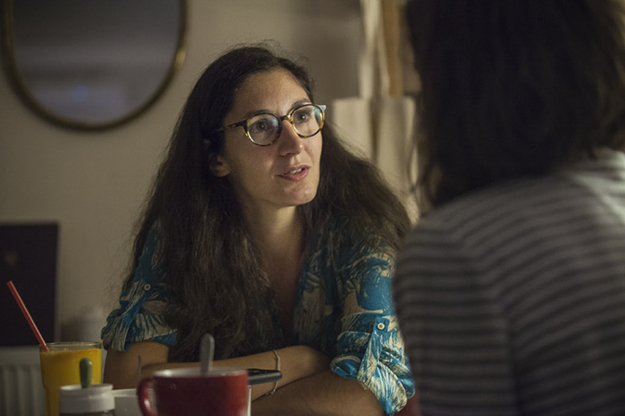
Photo: Majlinda Hoxha / K2.0.
K2.0 spoke with her in advance to get a glimpse of what whistleblowing is, its risks, and what is at stake when blowing the whistle.
K2.0: There are many stereotypes about whistleblowers in the post-Snowden and post-Wikileaks era. People often imagine a whistleblower to be a tech-freak who steals documents and puts them out into the world, destroying a big government. In reality, what is a whistleblower?
Cannelle Lavite-Dumoulin: I try to explain that whistleblowers are not [only] Edward Snowden but they can be anyone — they can be you or me. What they have to do to be a whistleblower, the common denominator, is just to have public interest.
They are people who see something in their work environment or in society and realize it is totally contrary to the interest of society as a whole. Then they decide that they cannot live with it, that they have to disclose it because they believe things cannot stay like that — it has to be disclosed for the benefit of the whole society.
Most people also have this image of whistleblowers as fighters against corruption, and it’s true, they are fighters against corruption, and they are also fighters for labor law, fighters for privacy, like Snowden, or fighters for government transparency, as we saw with Wikileaks, for instance.
But I think we need to really understand that they are simple people. There are a lot of cases that aren’t famous. They happen everyday. I get them on the phone, or people [reveal] them in court, but none of the cases get into the media..
These are just people at the local hospital, disclosing that elderly people are being mistreated; or a guy in a small accounting company saying that money is being redirected to the boss even though it should go back into the company… these kinds of small things.
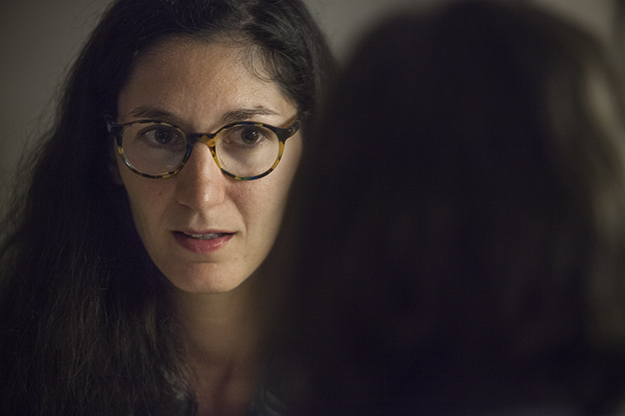
Photo: Majlinda Hoxha / K2.0.
How has the concept of whistleblowing evolved in line with an increased presence of the concept of open governance?
It basically evolved from the forms I just mentioned earlier. The first definition started in the U.S. in 1951 and it was specifically in the framework of disclosing, let’s say, a [morally] wrong secret — a secret from the government that it shouldn’t have. So this was government transparency.
The first laws [on] whistleblowing were mostly either looking only at public interest — disclosure of everything that has to do with public interest — or looking at corruption. So we have a lot of laws that are called [things like] ‘Law for the fight against corruption’ with a chapter on whistleblowing. In Europe that’s the case in Luxembourg and France.
Around 10 years ago, the approach of [countries introducing] a labor law began, so it was an approach under which employees at work were protected against unfair dismissal. It started because there was a very big case in the European Court of Human Rights, involving a German woman in the case Heinisch vs. Germany. She disclosed something that was happening at her workplace, and was dismissed from her job. That triggered the creation of laws, specifically targeting employees. So [protecting whistleblowers] would fall under the labor law, which was not very comprehensive, because as a whistleblower you have to go into the labor law to find something that protects you.
And then the [most recent] approach that is globalizing [the way in which the whole issue of whistleblowers is approached] is freedom of expression. Thanks to the European Convention on Human Rights and the European Commission, the recommendations by ministers that have been coming into place since 2014… these laws are saying that we need to harmonize the approach to whistleblowing. Specifically because we see that there is corruption on one side, labor laws and government transparency [on the other], and therefore this approach tries to bring all these elements together to create a legal status for whistleblowers — as someone who has the right to free speech, but also a social status.
If I ask several people in the street now, no one will have the same definition [of a ‘whistleblower’], because no one has the same experience and people don’t necessarily come from the same country, and we see whistleblowers as people bringing what society needs. So that’s the fourth approach, globalizing [a joined-up approach].
There are different pieces of legislation in place, both within the EU and outside of it, but what are the common risks that whistleblowers take?
There are two types of risks. There are legal risks — these are, of course, being convicted of a criminal offence, because usually if you’re a whistleblower and you want to disclose a document or a paper from your enterprise, you will be seen as someone who stole a document, because you have to take it with you. So there are the legal risks of being convicted on a criminal basis, but also on a civil basis, because your employer will claim that he needs damages for civil liabilities.
And also you have a lot of social risks: People will be harassed every day at work, they will be treated like spies, like snitches, they’ll lose their job. They can destroy your life, because if the employer tells other employers in the same sector that this guy won’t be loyal to you then that person is not going to get a job, and that happens quite a lot.
For instance, we have two cases of whistleblowers in India where basically their lives were broken because they couldn’t even get a loan at the bank after [they blew the whistle] because they were considered to be non-loyal people who would not only disclose what the employer did, which was [corrupt monetary practices], but that they would also not pay their loans. You’re blacklisted socially, professionally and also legally you face a lot of dangers, without legal aid most of the time.
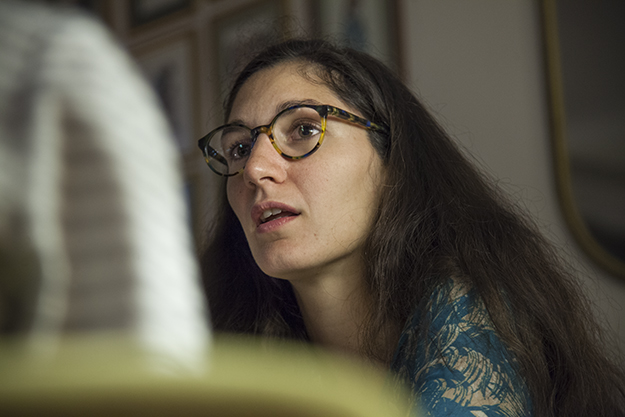
Photo: Majlinda Hoxha / K2.0.
You have mentioned different pieces of legislation, especially in the European framework, including cases tried at the European Court for Human Rights, which also sets precedent for Kosovo. But what are the black holes in the existing legislation for protecting whistleblowers today?
I’ll focus on EU member states. The biggest gap is that you don’t even have an act that is called ‘protection for whistleblowers.’ You don’t have a uniform set of protections, which means that you have fragmented pieces of procedure in the law, and this is not comprehensive at all. Whistleblowers and lawyers sometimes have a hard time understanding what applies, sometimes there is just a law that will protect witnesses, and it’s supposed to be part of whistleblowers’ protection. So that’s the main gap, that there is not even a law.
When there is one, I’d say that the major issues are the fact that they have limited options to disclose. Usually, what the best laws do, according to the European Convention on Human Rights, the U.N. Declaration on Human Rights, and all these human rights frameworks and studies that show how and why whistleblowers disclose, is that first you need to disclose internally, within your company; [then] externally; and then to the public.
The problem is that you have these three options but they are closed, because the law tells you that you have to go internally before going externally. If the mechanism within your enterprise is compromised, or if there is a big conflict of interest, basically you get trapped because your identity is known and you don’t even have the possibility of going externally because you will be retaliated [against] already.
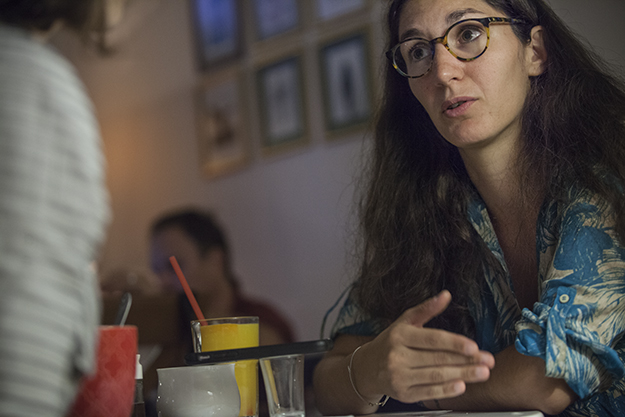
Photo: Majlinda Hoxha / K2.0.
Another gap in the laws is that they either don’t open up these three options or channels of disclosure — internal, external and public whistleblowing — or they offer the three of them but they oblige the whistleblower to go first internally before going elsewhere.
Maybe another gap, the one we see the most is putting the burden of proof on the whistleblower. If the whistleblower goes to court and says: “I have been dismissed from my job, or I have been harassed, or I have been convicted for defamation but this is just because I disclosed something against my employer,” then they have to prove that they were dismissed because they blew the whistle, which is very hard to prove sometimes. An employer can find a lot of reasons to dismiss someone. That’s a gap we still find in a lot of legislation.
In Kosovo, we’ve seen cases where a person blew the whistle and then they were demoted, or moved to a different city. There are consequences at work, but also on a personal level, including threats. There is now a new draft law to protect whistleblowers. What does a good law on whistleblowing have in it? What is something that it should definitely include?
Actually the [draft] law in Kosovo is a very good example of having thought about all the elements that should be in a good law. First it protects whistleblowers in the private and public sectors, and that’s one thing that a good law should have, so that it’s not only [employees in] one sector being protected. The second element is what I mentioned about the burden proof; the three channels of disclosure, which the law in Kosovo organizes.
Something very important is that there has been a shift in thinking about the motives of whistleblowers. A good law should not impose that the whistleblower has good faith when he/she discloses something.
There has been a shift, and a European directive, and many states in Europe, have approved legislation that simply say that the whistleblower has to have a reasonable belief that the information is true. Because what we want to know is: Is that information going to help or not? We don’t want to know if the whistleblower wanted to sell the information, we don’t care — the point is disclosing something for the public interest.
What happens if the information disclosed is found to be untrue?
If you reasonably believe that the information is true, you shouldn’t be convicted because [if you don’t believe it’s true] that would be defamation. But there are laws that have been using good faith by saying that if the information was false, and you can prove that you were acting in good faith, your conviction, if you’re convicted, will be reduced, because you can prove you were trying to do your best.
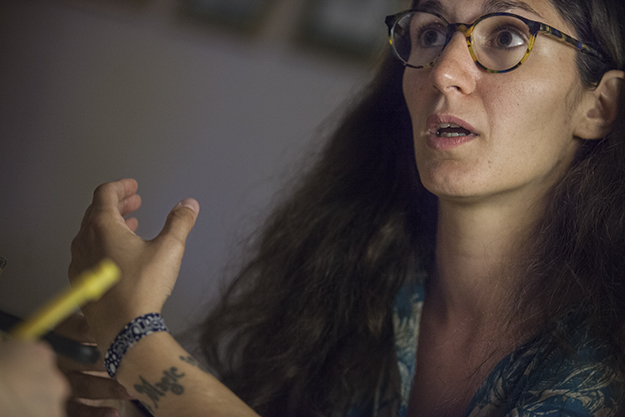
Photo: Majlinda Hoxha / K2.0.
From your current research, focused on the element of the right to asylum, how friendly is the EU when it comes to the protection of whistleblowers who seek asylum in an EU country?
Not friendly at all. The problem is that the answer to this question should be legal, but it’s political. We all know the whole reason why Snowden wasn’t given asylum is because nobody wants to mess up with the United States. Legally, a lot of countries could have [offered asylum]; in France we have a law that is perfect, it’s based on the constitutions of South American countries — Bolivia, Ecuador, Brazil, Colombia. It’s really a tradition for these countries to include asylum as a human right in their constitutions.
A lot of scholars are writing about asylum as a human right, and not as a state right, but Europe is not friendly at the moment. It had the possibility of giving asylum to Snowden, and to Julian Assange, for example, but it didn’t, and not because the laws weren’t there. Just because it didn’t want to. It didn’t help at all, it didn’t give any support at all, not financially, not politically, nothing was done.
Where does this fear in the EU countries — of protecting whistleblowers properly — come from? Does the influence of who is in power, for example in the case of the U.S. with Snowden, influence the offering of asylum?
Snowden’s application came through when Donald Trump wasn’t yet in power and it still got denied [under Barack Obama’s mandate]. And he offered to testify in the affair of the surveillance of Angela Merkel by the NSA, which is highly relevant for Germany, and he was not even allowed to do this by the German judicial system.
I really don’t know where this fear comes from. What I can imagine is that maybe they don’t want to also have ‘leakers’ — [or] what they call leakers. They call Edward Snowden a leaker — he is not a leaker, he is a whistleblower. The only mistake, or bad thing that he has [done] is that he disclosed classified documents and that means a different legal framework applies.
You just made a very particular difference between ‘whistleblowers’ and ‘leakers.’ Can you explain more about this.
It’s tricky because it’s partly my personal opinion. Something objective to say is that leakers and whistleblowers don’t have the same legal framework. Leakers disclose unauthorized documents that are protected as national secrets, and therefore they are then concerned with different laws to those concerning whistleblowers.
It’s different if you disclose a private secret from a company to if you disclose something from the state. You don’t follow the same laws, and this is why Edward Snowden is treated as a spy under the Espionage Act, by the United States. And, he wouldn’t even have a fair trial because it was classified documents.
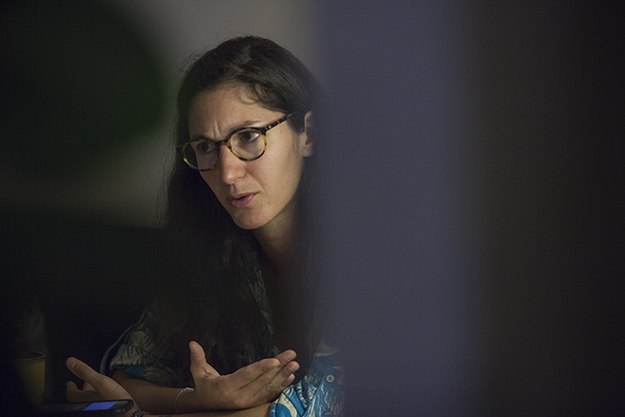
Photo: Majlinda Hoxha / K2.0.
So, what I think, and I belong to a specific school of thought, is that if you want to find one difference between the two of them, leakers disclose a lot of information that is classified and unauthorized information that may be interesting for the public, but not necessarily good for the public interest. They are releasing these documents as a resistance to government secrecy and opacity, and in the case of whistleblowers their ultimate goal is to release information that exposes harm to the public.
Leakers are disclosing quantity, they are not necessarily trying to find the specific document pointing to the problem, as Lux Leaks did for instance. They called it Lux Leaks but the whistleblower tried to make sense of all the documents he had, and that identified the issue of tax evasion in Luxembourg.
For instance, I don’t think that Wikileaks or Julian Assange are whistleblowers because he has a political stake in what he discloses. Julian Assange chooses the information he discloses, we saw that in the last U.S. electoral campaign.
How does this phenomenon affect the faith of whistleblowers, and the trust in them?
Very badly. That’s what me and my colleagues try to say. It’s hard to tell people that leakers aren’t necessarily whistleblowers, and whistleblowers aren’t gonna be here to disclose everything that concerns you.
I think the only way we can manage to change perceptions is to create civil society movements that will try to understand together what a whistleblower is, that will try to learn what is this difference with leakers, that it is the public interest that matters, and that anyone may see something tomorrow and realise that that’s really bad for our society. It’s not about being a geek and having access to thousands of documents because this is only a small portion of the society.
This is where maybe journalism can also contribute to playing a role. We’ve seen journalism as a huge ally of whistleblowers in helping to navigate those cases.
Journalists are very important for this perception of who whistleblowers are in society. It also depends on how they work. If it’s gonna be a journalist who is going to be the intermediary and disclose the leaks just like that, without telling exactly the whole story, what is the narrative behind it?
What I think happened with Snowden is that he created a whole narrative out of it, there were all these documents, all these amounts of information, but he justified it by saying this is about our privacy, we cannot live like this. He pointed this out very [well] in all the conventions that he could, and worked together with journalists and lawyers.
That’s also what Lux Leaks did — they created a narrative about tax evasion, which is creating disharmony in the EU market — they didn’t just leak it like that. They contextualized it and offered it to citizens.
What we also have to think about is that whistleblowers are people exercising their right to free speech but they are helping you to exercise access to information, which is another complementary element with free speech, together with a free press. So they are giving us something.
In Kosovo we’ve recently had a big case that experts in this field have considered as whistleblowing. A prosecutor publicly reported political interventions in his investigations, particularly in a case of an inflated list of war veterans entitled to certain state benefits, as well as a high profile corruption affair. Could a Kosovar receive asylum in the EU for being a threatened whistleblower?
It’s complicated, and differs from one EU country to another… There is this presumption about democratic countries, so if you’re prosecuted in a country from Europe, it is presumed as coming from a democratic country.
To answer your question, of course theoretically you have your right to ask for asylum, especially because this really amounts to political opinion, because he is a political person, even though he is part of the judiciary, he still exists in a political function as a prosecutor. But I think the presumption of [Kosovo being] a democracy would just hinder all his rights to get asylum in Europe. I don’t think it would be a solution, that would be very hard to prove.
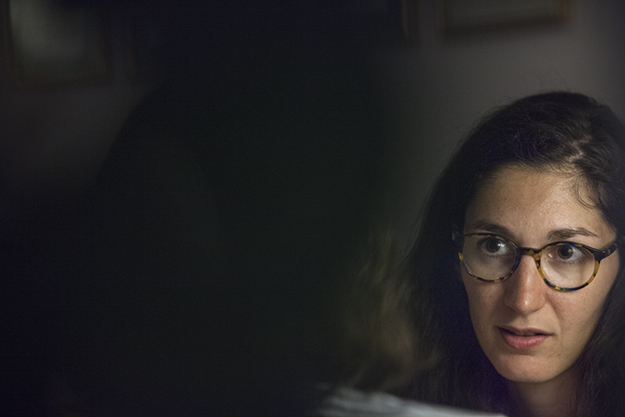
Photo: Majlinda Hoxha / K2.0.
It’s not only that it would be hard to prove that he has threatening conditions, it’s just that there is a presumption that tells him, well, your [asylum application] is just dismissed. So, it’s even harder. Maybe there are specialists who would be able to find a solution, but I honestly think that is not an option unless he faces extremely serious persecution as this is a country with a judiciary that works and has elements of rule of law in place.
What is at the frontline of advocacy in the protection of whistleblowers today, within the European framework?
You have good laws but there is no good implementation. I think that for Kosovo that’s the major challenge — try not to pass a law that has been forced onto society. That’s why it’s important that people, before the law is introduced, understands who these whistleblowers are; that judges understand what this law is going to mean and what is going to change in terms of labor law, criminal law… Because it’s going to change the law.
A law that is not being implemented is not only a law that is not being implemented. It’s a law that will be seen as a protective shield for someone who reads the law and says, “Oh, there’s a law protecting whistleblowers…” and it will be counterproductive because people will fool themselves into thinking that they are protected, and people will be severely retaliated against. So, a law that is not well implemented can be very dangerous.
People who would otherwise have been convicted of defamation, or stealing trade secrets, or violating confidentiality, will basically be protected by the law because they are disclosing something of public interest, and this will be normal, this will be implementing human rights. But you have to train judges, you have to alter this in society, you have to help lawyers as well, because it’s hard for lawyers to provide good advice and understand the implications of the law too.
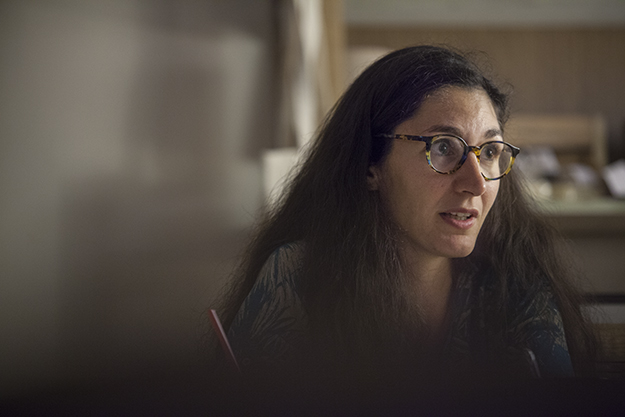
Photo: Majlinda Hoxha / K2.0.
What would you say to someone who is considering speaking up and blowing the whistle? What should one bear in mind before taking that step?
They should bear in mind that there are a lot of consequences, in your private life, in your professional life, that you cannot expect unless you talk to someone who can advise you. My advice is don’t take this decision alone — really don’t. Because there are a lot of networks, are not just here in Europe but also further afield, that you can contact, in confidence and with anonymity — you can tell them what you think you can disclose. They can put you in touch with lawyers and journalists in your region.
Don’t take this decision alone, because there are a lot of consequences that you wouldn’t expect and a lot of state violence, and judicial violence that you can face, and that can be very hard to take, especially when you’re a person who just wants to do something good. K
This conversation has been edited for length and clarity. The interview was conducted in English.
Feature image: Majlinda Hoxha / K2.0.









